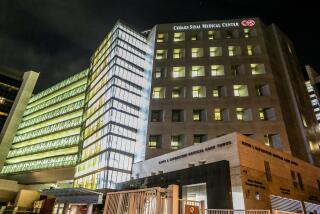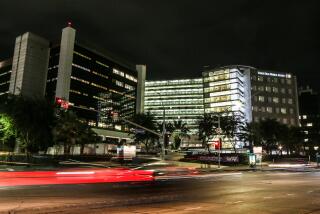Cedars finds more patients exposed to excess radiation
Cedars-Sinai Medical Center officials said Monday that 260 patients had been exposed to high doses of radiation during CT brain scans during an 18-month period, up from the hospital’s original estimate of 206 in September.
A review by the hospital also found that about 20% of the patients received exposure directly to the lenses of their eyes, which puts them at a higher risk for cataracts, said Simi Singer, a spokeswoman for the Los Angeles hospital.
Of the newly identified cases, 47 patients had died by the time the hospital began contacting victims -- a reflection, officials said, of their serious illnesses, not the radiation exposure. Seven more patients were identified as a result of the ongoing investigation.
Hospital officials said the lens exposure problem was discovered after a review of patients’ scans.
In a letter to patients that was sent Monday, the hospital’s chief operating officer and chief medical officers apologized for the overdoses and said that Cedars will pay for any medical care associated with them. The hospital also offered patients a chance to meet with a specialist to answer any questions or concerns.
In addition, the hospital is telephoning the patients whose lenses may have been exposed, officials said.
Hospital officials have said the accidental overdoses began in February 2008 after the hospital reconfigured a scanner. The mistake affected only patients undergoing CT brain perfusion scans, which are used to diagnose strokes.
The error wasn’t discovered until August 2009, when a patient who received a scan reported hair loss to the hospital.
About 80 patients temporarily lost patches of hair as a result of the scans, which delivered eight times the necessary radiation. The hospital has established a chain of authority for making such reconfigurations to ensure that they do not result in excess radiation, hospital officials said. CT technologists, who run the machines, will receive extra training.
--
More to Read
Sign up for Essential California
The most important California stories and recommendations in your inbox every morning.
You may occasionally receive promotional content from the Los Angeles Times.











